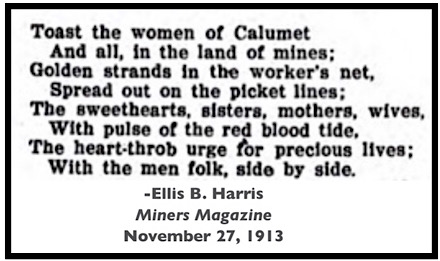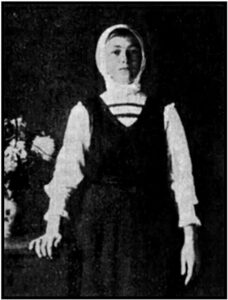 —————
—————
Hellraisers Journal – Wednesday February 25, 1914
Margaret Fazekas Testifies Before House Subcommittee
Tuesday February 24, 1914 – Hancock, Michigan
Although only 14 years old, Margaret Fazekas appeared before the Congressional Investigating Committee this morning and held her own throughout the long interrogation. Margaret is the young girl who was shot in the back of the head last September as she performed her picket duty:

MARGARET FAZEKAS, a witness, sworn, testified on examination as follows:
Mr. HILTON [Attorney for the Miners]. How old are you?
The Witness. I was 14 in August.
Mr. HILTON. Where do you live?
The Witness. Wolverine.
Mr. HILTON. Do you remember the 1st day of September last and what happened on that day?
The Witness. Yes, sir. _ ,
Mr. HILTON. Tell what happened on the 1st day of September.
The Witness. September 1 I went out on picket duty with the other women. We were marching back and forth on the streets, and there was about 13 deputies, and there was some more deputies on the other side to those that were close to us. There were about 13, and they were telling us—we weren’t doing any harm at all—they told us to go home for breakfast, and we said we had just as much— we can stay there just as well as they can. We weren’t doing any thing at all. Some of the ladies told them to go for breakfast, and then they turned back, and we thought they were going home for breakfast. But when they turned back toward us they had the revolvers in their hands, and they started shooting, and as soon as I saw the revolvers I turned back and started to run, and so I don’t know anything afterwards.
Mr. HILTON. Were you shot?
The Witness. Yes, sir.
Mr. HILTON. Show the committee where you were shot. (The witness removed her hat and indicated to the committee the location of the wound on the side of her head.)
The Witness. My hair is on top so it doesn’t show.
The CHAIRMAN [Congressman Taylor]. Is it in the back of the head, just behind the left ear?
The Witness. Yes, sir.
The CHAIRMAN. Did the bullet enter your brain?
The Witness. I don’t know. Dr. Roach said some of my brain came out, but he put it back in again, and he took a bone out of it—a small bone.
Mr. HILTON. How long were you in the hospital?
The Witness. Four weeks and a half.
Mr. HILTON. Not expected to live? The
Witness. No, sir; nobody expected it.Mr. HILTON. How many brothers and sisters have you?
The Witness. Six.
Mr. HILTON. Now, at that time did you see any stones, or was there any violence at all?
The Witness. No, sir. –
Mr. HILTON. You were just running away, as I understand it, when they shot you?
The Witness. Yes, sir.
The CHAIRMAN. Let me ask a question or two. How old are you?
The Witness. I was 14 in August.
The CHAIRMAN. Are your father and mother living?
The Witness. Yes, sir.
The CHAIRMAN. Are you living with your parents?
The Witness. Yes, sir.
The CHAIRMAN. Is your father a naturalized citizen?
The Witness. I don’t know. .
The CHAIRMAN. What is his name?
The Witness. John.
The CHAIRMAN. How many children of you?
The Witness. Five, besides myself.
The CHAIRMAN. Do you know whether your father votes or not?
The Witness. I don’t know; my father is not here.
The CHAIRMAN. What nationality are you?
The Witness. Hungarian.
The CHAIRMAN. How long have you been in this country?
The Witness. I was 3 years old when they came out.
The CHAIRMAN. You are now 14?
The Witness. Yes, sir.
The CHAIRMAN. Is your father one of the strikers?
The Witness. Well, my father—I don’t know where my father is. My father is not here a long time ago.
The CHAIRMAN. Has he been living in this country here?
The Witness. Yes, sir.
The CHAIRMAN. Is he just temporarily away, or how long has he been gone?
The Witness. He went away before the strike.
The CHAIRMAN. And you have been living with your mother and the other children?
The Witness. Yes, sir.
Congressman SWITZER. Was your mother with you on this occasion.
The Witness. No, sir.
Congressman SWITZER. Did you have her permission to go out in this big crowd of people—was it a large crowd of people?
The Witness. Yes, sir.
Congressman SWITZER. They were parading?
The Witness. Yes, sir. We were on picket duty.
Congressman SWITZER. Did she send you out there?
The Witness. My mother didn’t send me out; only some of the other ladies called for me.
Congressman SWITZER. What you understood to be picket duty?
The Witness. Yes, sir.
Congressman SWITZER. Your notion of picket duty was just parading around?
The Witness. Yes, sir.
Congressman SWITZER. And what else were you to do—anything?
The Witness. No; we weren’t doing anything else.
Congressman SWITZER. Did your mother tell you to go out in that crowd?
The Witness. No, sir.
Congressman SWITZER. How did you come to be out there?
The Witness. Some neighbors knocked at the door and they called me.
Congressman SWITZER. Some men asked you to come out?
The Witness. No, sir.
Congressman SWITZER. Who were the neighbors?
The Witness. There was quite a few ladies that came to call.
Congressman SWITZER. And they went out with you, did they?
The Witness yes sir
The Witness. Yes, sir.
Congressman HOWELL. Have you any brothers or relatives who are strikers?
The Witness. Yes, sir.
Mr. MCCORMICK [Appearing for the sheriff & board of supervisors of Houghton County]. What time in the morning was it when you went out on picket duty?
The Witness. I went after 5, and it was around 7 o’clock when I was shot.
Mr. MCCORMICK. Do you know who came for you that morning?
The Witness. Why, some neighbors; some of the ladies.
Mr. MCCORMICK. Strikers?
The Witness. Yes, sir. –
Mr. MCC0RMICK. Were there little children in the head of the parade or on picket duty?
The Witness. Yes, sir.
Mr. MCCORMICK. They placed you right in the front ranks, did the ?
The Witness. Yes, sir.
Mr. MCCORMICK. Now, just where did this shooting take place?
The Witness. I was between the property road going toward the Kearsarge mine, and the back road there; that back road—two roads are crossing.
Mr. MCCORMICK. The strikers or paraders were stopped at the corner at this time, weren’t they?
The Witness. Yes, sir.
Mr. MCCORMICK. That blocks the road leading down to the shaft, doesn’t it.
The Witness. Yes, sir.
Mr. MCCORMICK. There were some people there, men going to work .
The Witness. Yes, sir.
Mr. MCCORMICK. The strikers attempted to stop the men from going to work.
The Witness. No, sir; we did not stop any of them.
Mr. MCCORMICK. Well, there was some trouble there. About how many were in the parade that morning?
The Witness. I can’t tell how many there was; about—
Mr. MCCoRMICK. Three or four hundred-?
The Witness. There was about 100 women. I don’t know how many men there was, because there wan’t many.
Mr. MCCORMICK: Lots of men there?
The Witness. es, sir.
Mr. MCCORMICK. Lots of ,children?
The Witness. There wasn’t—
Mr. MCCORMICK. Lots of little girls like you there, weren’t there?
The Witness. There was only about four or five.
Mr. MCCORMICK. You were stopped parading, stopped right on this corner—blocking the road of the workmen—where the workmen had to go to the shaft.
The Witness. Yes, sir.
Mr. MCCORMICK. There was some trouble there?
The Witness. We didn’t do any trouble.
Mr. MCCORMICK. Wasn’t there some shots fired between the strikers and the deputies?
The Witness. No, sir.
Mr. MCCORMICK. Didn’t the strikers force the deputies back up against the fence?
The Witness. No, sir.
Mr. MCCORMICK. You didn’t see that? What were you running or.
The Witness. I was running when they shot their revolvers, then I started to run, but I didn’t know which way I ran so I ran some where, or which way I was running when I got frightened.
Mr. MCCORMICK. Were you in front of the strikers when you saw the revolvers?
The Witness. Yes, sir.
Mr. MCCORMICK. And the men were behind you, weren’t they?
The Witness. Yes, sir.
Mr. MCCORMICK. They were throwing stones?
The Witness. No, sir.
Mr. MCCORMICK. And missiles at the workmen going to work?
The Witness. No, sir.
Mr. MCCORMICK. Were they throwing stones and the missiles at the deputies?
The Witness. They didn’t throw anything.
Mr. MCCoRMICK. You didn’t see anything thrown?
The Witness. No, sir.
Mr. MCCORMICK. Do you know of anybody else who was injured besides you that morning?
The Witness. I don’t know anything afterwards only as I heard since.
Mr. MCCORMICK. That is all.
Maj. PEPPER. Margaret, did anyone tell you after you recovered your consciousness who gave you the first aid to your injuries?
The Witness. I don’t know.
Maj. PEPPER. Whether or not the soldiers came and gave you the first aid, took care of your wounds?
The Witness. The doctor was over there from the hospital.
Maj. PEPPER. The doctor?
The Witness. Yes.
Maj. PEPPER. Do you mean Dr. Roach?
The Witness. Yes.
Maj. PEPPER. You have not heard anybody say since you recovered that the soldiers came there and took care of you?
The Witness. I didn’t know nothing for about a week.
Maj. PEPPER. That is all.
The CHAIRMAN. This is the same case that is referred to in the Senate Document 381, is it not?
Mr. HILTON. Yes.[Photograph and emphasis added.]
~~~~~~~~~~~~~~~~~~~~~~~~~~
SOURCES
Quote Poem Ellis B Harris re Annie Clemenc n Women of Calumet,
Miners Magazine p14, Nov 27, 1913
https://babel.hathitrust.org/cgi/pt?id=uiug.30112043506416&view=1up&seq=454
Conditions in Copper Mines of Michigan
Hearings before a subcommittee of the Committee on mines and mining, House of Representatives, Sixty-third Congress, Second session pursuant to H. Res. 387.
(Feb 9-Mar 23, 1914)
Volumes I-VI
https://catalog.hathitrust.org/Record/011597245
Part III, Feb 23, 25, 1914 p.1057-1327
https://babel.hathitrust.org/cgi/pt?id=uc1.aa0016263071&seq=7
Contents, Witnesses p1059
https://babel.hathitrust.org/cgi/pt?id=uc1.aa0016263071&seq=9
Feb 24, 1914, Hancock MI, Testimony of Margaret Fazekas p. 1163
https://babel.hathitrust.org/cgi/pt?id=uc1.aa0016263071&seq=113
IMAGE
Margaret Fazekas, ab 1914
https://michigansup.fandom.com/wiki/Margaret_Fazekas
See also:
Hellraisers Journal – Saturday September 6, 1913
Kearsarge, Michigan – Young Margaret Fazekas Shot Down by Deputies
Hellraisers Journal – Tuesday February 24, 1914
Hancock, Michigan – Deputized Company Gunthugs Brutalize Women
Tag: Margaret Fazekas
https://weneverforget.org/tag/margaret-fazekas/
https://weneverforget.org/tag/michigan-copper-country-strike-of-1913-1914/
~~~~~~~~~~~~~~~~~~~~~~~~~
Union Maid – Bobbie McGee
